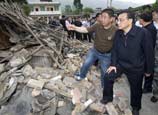
ROME, April 21 (Xinhua) -- The first major breakthrough in Italy's eight-week-old political crisis left things where they were when it started: with 87-year-old Giorgio Napolitano as president and former European Commissioner Mario Monti at the head of a caretaker government.
But analysts say the way is now cleared to resolve the crisis, which was sparked when none of the coalitions gathered enough votes to achieve a Senate majority after Italy's Feb. 24-25 national vote.
The impasse was complicated because Napolitano, whose seven-year term was set to expire May 15, was prohibited from taking certain steps during the last six months of his mandate.
The three main blocks -- the center-left under Pier Luigi Bersani, the center right under media tycoon and three-time Prime Minister Silvio Berlusconi, and an anti-establishment block led by former comedian Beppe Grillo -- failed to negotiate a compromise.
That turned attention to the selection of Napolitano's successor, who would have been charged with shepherding through political reforms and possibly dissolving parliament and calling new elections.
Now that responsibility will fall on Napolitano himself, who reluctantly agreed to stand for a second term after early ballots, marked by the same infighting that resulted in the stalemate, failed to elect a president.
Napolitano had already been the first former member of the Italian Communist Party to be elected president, and now he is the first person selected for a second mandate as president. He was elected on the sixth ballot late Saturday, meaning that Rome woke up Sunday -- the 2,766th anniversary of the city's founding -- with new hopes the protracted crisis will be resolved.
There is no indication yet how that will be achieved. But a change that helped spark Napolitano's change of heart -- the resignation of Bersani -- is also likely to play a key role in how the three-way political chess match plays out.
It means the coalition will elect a new leader: the most likely candidate will be Florence mayor Matteo Renzi, who precipitated the series of events that resulted in Bersani's resignation by refusing to back former Senate speaker Franco Marini for president after Marini emerged as a compromise selection in negotiations between allies of Bersani and Berlusconi. Speculation is that Renzi, more dynamic and 24 years younger than the 61-year-old Bersani, could siphon support away from Grillo and Berlusconi.
It is unlikely that Napolitano, who will turn 88 in June, will serve out his full seven-year term. He was eager to return to private life, and even he said the notion that he might be president at age 94 was "ridiculous." But the task of ending the current crisis falls squarely on Napolitano's shoulders, though he could resign afterwards.
A new vote now seems assured, though it is likely Napolitano will try to first push through a package of electoral reforms that would make another standoff less likely. The game plan is expected to be revealed in the coming days.
In the meantime, Monti will stay on as the head of a caretaker government. Monti took the prime minister's job in November 2011 after Berlusconi stepped down amid personal and legal scandals and growing fears Italy could fall victim to the European debt crisis.
His painful austerity policies helped assuage international investor fears, but they also eroded his support to the point that his coalition finished a distant fourth in February's vote. Now he must work with Napolitano to keep the economic crisis at bay until a new prime minister can be selected. 
















 Baby born right after earthquake in SW China
Baby born right after earthquake in SW China


![]()
